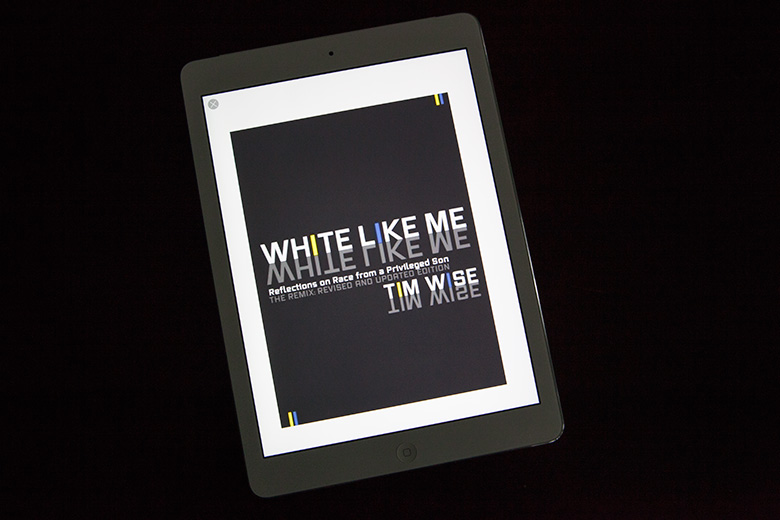
Back in June when I talked about how uncomfortable I am with approaching the topic of race on this website (or anywhere, for that matter) a few readers left comments and sent emails urging me to check out various reading materials. The one book that appeared most in those suggestions was White Like Me: Reflections on Race from a Privileged Son by Tim Wise, an anti-racism activist and writer from Nashville, Tennessee.

I am only halfway through the book but have highlighted so many passages already that I knew I had to stop, especially right now, and share some of his insights here. What I’m experiencing while reading this text is a lot like what I experienced when I read that transforming essay my junior year in college: a burning in my face and stomach, a laying out in very specific terms my lingering and embarrassing ignorance and laziness.
I read some of the criticism of the book that says Tim comes across as a very angry and “tedious” white person, and there were a few times when I wanted to agree with that sentiment except this excerpt explains why I could not bring myself to:
“Hardly any aspect of my life, from where I had lived to my education to my employment history to my friendships, had been free from the taint of racial inequity, from racism, from whiteness. My racial identity had shaped me from the womb forward. I had not been in control of my own narrative. It wasn’t just race that was a social construct. So was I.”
He wrote this book not to make white people feel guilty for being white. Guilt is a pretty useless, ineffectual emotion, and he knows this. Guilt is not what I feel when coming to these realizations. In fact, I feel duty.
He wrote this to help white people understand and accept that everything we experience from the moment we take our first breath is influenced by the institution of racism that has shaped this country from its inception. He’s wildly angry, and rightfully so, that so many of us do not realize this, and because we don’t recognize the privilege that has branched out into every single aspect of our lives we are ourselves ineffectual at destroying that institution. In fact, he posits and makes one hell of an argument for it, that we are responsible because of our privilege for dismantling it. Until we do there will continue to be yet another Michael Brown, yet another Trayvon Martin, yet another Eric Garner, yet another Renisha McBride, yet another, yet another and yet another.
My god, this is a powerful read and I would urge even the most conservative among you to take a look at a few pages and examine where you were born, where you live, your own education, your employment history, even your ability to walk down the street without being questioned whether or not you belong there.
Every single conservative Southerner I know on Facebook is going to foam at the mouth if they get two sentences into this, but I hope they take the time to read at least those two sentences.
If there are so many excerpts here that it would upset the publisher, I understand and will whittle them down. But this just touches the surface of what he surgically cuts open and peels back in this book. And there is still so much more. Buy it and read it.
……
“Only by coming to realize how thoroughly racialized our white lives are can we begin to see the problem as ours, and begin to take action to help solve it. By remaining oblivious to out racialization we remain oblivious to the injustice that stems from it, and we remain paralyzed when it comes to responding to it in a constructive manner.”
……
“Although we white Americans often think we’ve had few first-hand experiences with race, because most of us are so isolated from people of color in our day-to-day lives, the reality is that this isolation is our experience with race. We are all experiencing race, because from the beginning of out lives we have been living in a racialized society, in which the color of our skin means something socially, even while it remains largely a matter of biological and genetic irrelevance.”
……
“As for concept of privilege, here, too, clarification is in order. I am not claiming, nor do I believe, that all whites are wealthy and powerful. We live not only in a racialized society, but also in a class system, a patriarchal system, and one of straight supremacy, able-bodied supremacy, and Christian hegemony…. But despite the fact that white privilege plays out differently for different people, depending on these other identities, the fact remains that whiteness matters and carries great advantage.”
……
“When we first draw breath outside of the womb, we inhale tiny particles of all that came before, both literally and figuratively. We are never merely individuals; we are never alone; we are always in the company of others, of the past, of history. We become part of that history just as surely as it becomes part of us. There is no escaping it; there are merely different levels of coping. It is how we bear the past that matters, and in many was it is all that differentiates us.”
……
“What does it mean to be white in a nation created for the benefit of of people like you?… Being a member of the majority, the dominant group, allows one to ignore how race shapes one’s life. For those of us called white, whiteness simply is. Whiteness becomes, for us, the unspoken, uninterrogated norm, taken for granted, much as water can be taken for granted by a fish.”
……
“We are, unlike people of color, born to belonging, and have rarely had to prove ourselves deserving of our presence here. At the very least, our right to be here hasn’t really been questioned for a long time.”
……
……
“Genealogy itself is something of a privilege, coming far more easily to those of us for whom enslavement, conquest, and dispossession of our land has not been our lot. Genealogy offers a sense of belonging and connectedness to others with firm, identifiable pasts, pasts that directly trace the rise and fall of empires, and which correspond to the events we learned about in history classes, so focused were they are the narratives of European people.”
……
“Though many would excuse the barbarity of enslavement by suggesting that such an institution must be judged by the standards of its own times, rather than today, I make no such allowance, and find it obscene when others do so. It is simply not true that ‘everyone back then felt that way,’ or supported slavery as an institution. Those who were enslaved were under no illusion that their condition was just.”
……
“Simply being born to a white family meant certain things about the experiences I was likely to have once born: where I would live, what jobs and education my family was likely to have had, and where I would go to school.”
……
“I say this not to suggest any guilt on my part for having inherited this legacy, It is surely not my fault that I was born, as with so many others, into a social state over which I had little control. But this is hardly the point, and regardless of our own direct culpability for the system, or lack thereof, the simple and incontestable fact is that we all have to deal with the residue of past actions.”
……
“Just as a house or farm left to you upon the death of a parent is an asset that you get to use, so too is racial privilege; and if you get to use an asset, you have to pay the debt accumulated, which allowed the asset to exist in the first place…. Those who reap the benefits of past actions—and the privileges that have come from whiteness are certainly among those—have an obligation to take responsibility for our use of those benefits.”
……
“At the level of labels, racism has long operated to impose white reality onto others. Whites found assertion of blackness (and especially as a positive, even “beautiful” thing in the 1960s and 1970s) threatening because it was an internally derived title unlike ‘color’ or ‘Negro,’ terms which had been foisted upon black bodies by the white and European traditions. Likewise, many whites today react hostly to the use of the term ‘African American’ because it came from within the black community, and as such, stands as a challenge to white linguistic authority.”
……
“Anything that makes us feel proud can be said, facts notwithstanding. Anything that reminds us of the not-so-noble pursuits of our forefathers or national heroes, on the other hand, gets dumped down the memory hole. And if you bring those kinds of things up, you’ll be accused of hating America.”
……
“Mr. Kennerly, my geography teacher, made a lasting impression on my when explaining that Western concepts of ‘civilization’ were subjective, and that the term should not be used when referring to the U.S. or the industrialized world, especially not in relation to non-Western societies who had their own social and cultural understandings of what a good society should look like. We use the word ‘civilization to mean ‘materially wealthy’ and technologically advanced, even though material wealth and technology are often used for uncivilized, unethical ends.”
……
“Colorblindness is not the proper goal of fair-minded educators… To not see color, is, as Julian Bond has noted, to not see the consequences of color. And if color has consequences, yet you’ve resolved not to notice the thing that brings about those consequences, the odds are pretty good that you’ll fail to serve the needs of the students in question.”
……
“Whites (especially affluent ones) much more so than folks of color, have the luxury of looking at life or death issues of warm peace, famine, unemployment, or criminal justice as a game, as a mere exercise in intellectual and rhetorical banter.”
……
“Whiteness is about never being really out of place, of having the sense that wherever you are, you belong, and won’t encounter much resistance to your presence.”
……
“It isn’t the job of people of color to fix us; is it our job. It is on us to practice that ‘personal responsibility’ about which we so readily preach to people of color.”
